The forthcoming US election is a momentous one. Many in the US argue that it is the most important US election in living memory for several reasons. Others abroad agree because who becomes President has enormous potential consequences not just for the US, but for the rest of the world.
From an economic perspective, the implications perhaps appear less clear, particularly as the election is taking place against the background of a global pandemic and consequent economic downturn deriving from a government-mandated shutdown to prevent the spread of the virus. In turn, this has led to most of the world’s advanced economies (except China) experiencing the worst economic slowdown for a hundred years, fuelling unemployment, socially disadvantaging large swathes of the populace, and highlighting the fissures in society.
Fact-checking the claims
Trump argues, of course, that he can rebuild the US economy as he did previously, and that the pandemic has turned a corner. Meanwhile, Biden has accused Trump of mishandling the epidemic and being the worst President in history. But which claim holds water based on track record and potential future policy actions?
As we know, the pandemic is far from over, and deaths have already topped 1 million around the world. The US has fared remarkably poorly. Accounting for around 4% of the world’s population, it has accrued 21% of COVID-19 related deaths. Facing, too, the worst recession since the 1920s (preceded incidentally by the flu pandemic), it’s perhaps no surprise that Trump’s domestic and global popularity is so low.
If we look purely at the economic performance of the US compared to other major economies, it’s not that bad, which is testament to its resilience. However, the first half of 2020 was a wipe-out and, when you’re running into an election, that’s what matters.

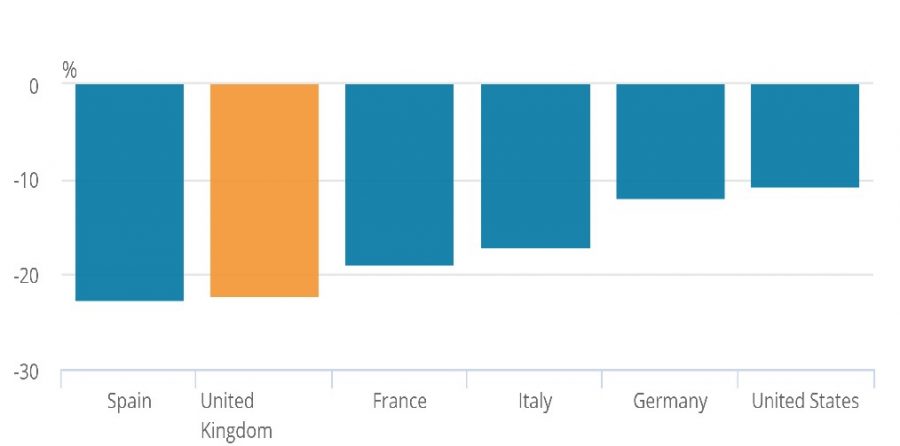
Presidential comparisons
By comparing US economic performance under Trump to under Obama and George W. Bush, we see an interesting picture. Whilst I would argue that presidents have very little to do with the performance of the economy, if they’re happy to take the credit, they must also be prepared to take the blame. When Obama was inaugurated in January 2009, we had then seen the worst global economic downturn in a hundred years, induced by the Global Financial Crisis (GFC). Hence, Bush bequeathed Obama an economy that was contracting sharply.
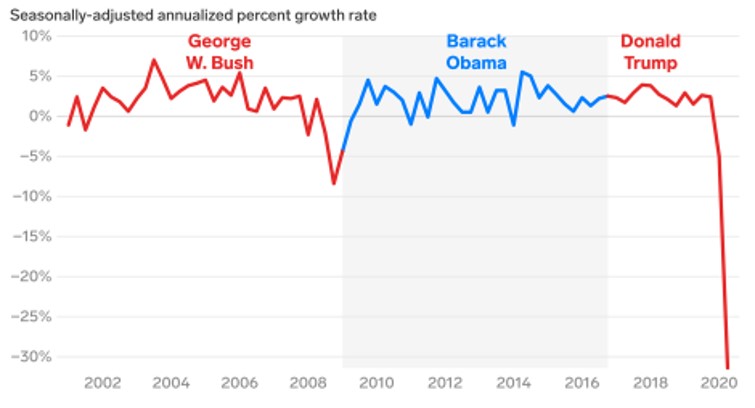
Trump is often keen to point out the strength of US companies under his tenure, and indeed, the stock market has continued to rise during his presidency. However, it has faced far more volatility than under either Obama or Bush.

Under Obama, the US economy overall recovered at a faster rate than under both his predecessor and his successor. Employment recovered rapidly and continued to grow throughout his term in office. Admittedly, it also continued to grow during Trump’s first four years as President. Unemployment also fell from a high point under Bush to low levels under Obama, a trend that continued under Trump until the impact of the pandemic was felt.
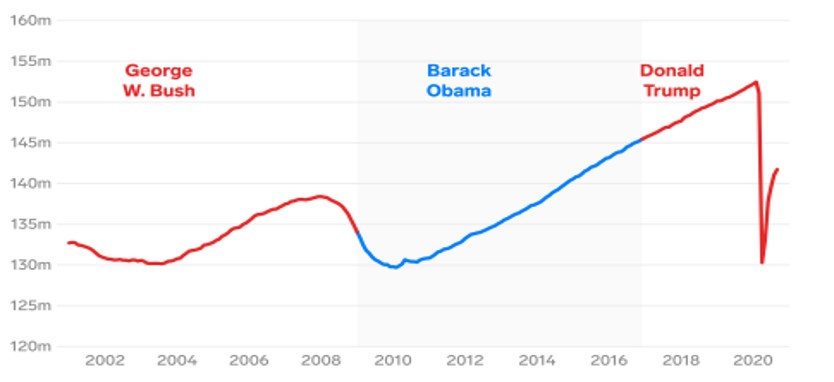
In terms of wage growth, the increase in wages has been slower under Trump than under Bush, whilst wage growth under Obama was poor, albeit in line with many advanced economies grappling with sustained low productivity following the GFC. So, wage growth could be seen as a triumph of the Trump presidency. If we look at median incomes, these too have continued to rise further under Trump, latterly due to tax cuts.
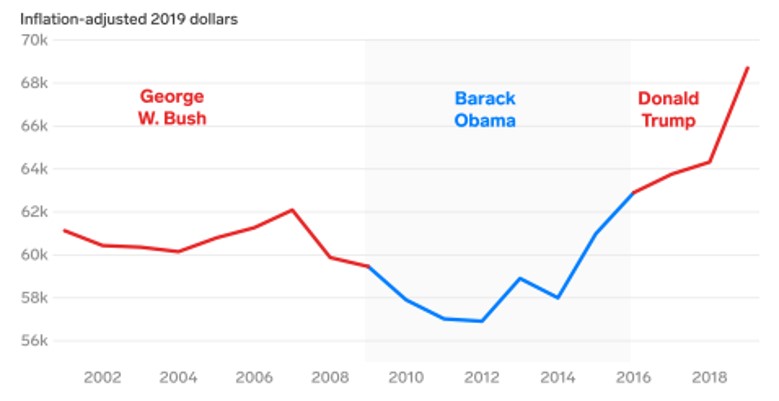
Growing deficits
The tax cuts, of course, were not paid from surplus or a reduction in spending, and so have increased the fiscal deficit. With the pandemic also adding to the requirements to spend, the US fiscal deficit has grown considerably. Should Trump lose the election, he will bequeath Biden a significant fiscal deficit – a pattern we have seen repeated in recent shifts between Republican and Democrat presidencies.
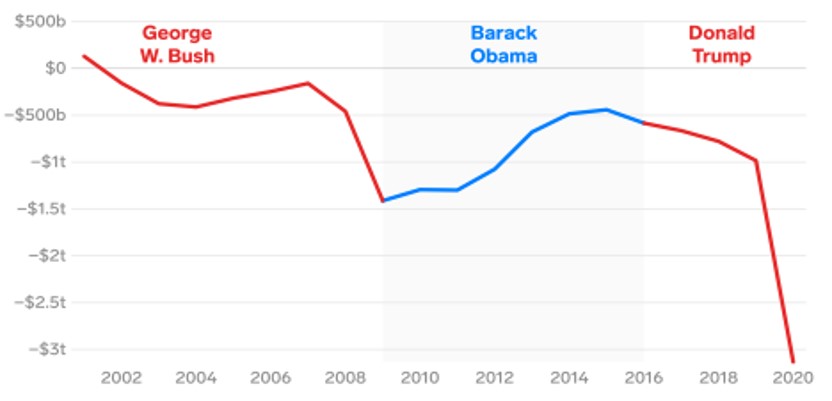
Speaking of deficits, Trump has been particularly vociferous in his pursuit of trade wars, designed to reduce the US trade deficit and to stop the US being taken advantage of by cheap imports. It is quite clear, however, that the trade wars have not worked; the opposite has occurred, and the deficit is wider than ever. Moreover, it has particularly increased with China – perversely it’s intended target. The real effect of this pursuit of isolationism is to lower the esteem of the US in the eyes of the rest of the world, making Trump one of the least globally admired US Presidents ever.

A landslide – or not?
But in an election year with the focus on the domestic agenda, what counts is perception. Despite the US being one of the wealthiest countries in the world, it also the third most unequal when it comes to income distribution. This is reflected in the disparity between urban and rural in the US; in the effects of the pandemic, and it is reflected in the death rates we have seen from lack of health coverage for the disadvantaged.
Looking ahead, Trump doesn’t believe in a market-based economic system, but in ‘crony-capitalism’ as his policy of cutting taxes shows as 80% went to those on the top 20% of the income distribution. Moreover, if he succeeds in securing another four years, he will continue to undermine the checks and balances in the institutions of the US, as he has to date.
If you use purely economic metrics – unemployment levels, economic growth, rate of manufacturing employment and so on – Trump has a vanishingly low chance of winning. However, surprises do happen, and the current electoral system in the US for choosing the President can give the office to a candidate that loses the popular vote – as it did for Trump in 2016 and Bush in 2002.

